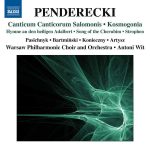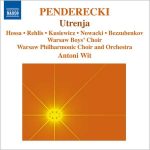
Composer: Krzysztof Penderecki
Performer: Warsaw Philharmonic Choir
Orchestra: Warsaw Philharmonic Orchestra
Conductor: Krzysztof Penderecki
Format: FLAC (tracks)
Label: Warner
Catalogue: 9029581955
Release: 2017
Size: 342 MB
Recovery: +3%
Scan: cover
CD 01
St. Luke Passion
01. Part II: XI. Stabat Mater
02. Part I: VII. Ut Quid, Domine
03. Part I: XII. Miserere mei, Deus
04. Part II: VII. In Pulverem Mortis
05. Veni Creator
Psalmy Dawida, Psalm XXX
06. Bede Cie Wielbil, Panie
07. Piesn Cherubinow
Dies Illa
08. III. Quid Sum Miser
09. V. Recordare
10. O Gloriosa Virginum
11. My Tez Pastuszkowie
12. Kaczka Pstra
CD 02
Missa Brevis
01. I. Kyrie
02. II. Gloria
03. III. Sanctus
04. IV. Benedictus
05. V. Benedicamus Domino
06. VI. Agnus Dei
Magnificat
07. VI. Sicut Locutus Est
Kadisz
08. III. Prosimy Cie
Polskie Requiem
09. XI. Agnus Dei
10. Benedictum Dominum
Symphony No. 7, “Siedem Bram Jerozolimy”
11. III. De Profundis
Powialo Na Mnie Morze Snow, Pt. 3
12. XIX. Grob Potockiej
Trzy Utwory W Dawnym Stylu
13. I. Aria
The first album from the series Warsaw Philharmonic: Penderecki conducts Penderecki was widely acclaimed and garnered several awards, including a GRAMMY (Best Choral Music Album) along with major prizes from the Fryderyks, O!Lśnienie (the Onet.pl website) and many others. These accolades affirm that the release of this album is not only a historic event – the composer conducting his own works for the first time recording with the Warsaw Philharmonic Orchestra and Choir – but also serves as a reminder that classical music is a great source of pride for Poland and a major attraction on the international scene.
The release on the fairly commercially oriented Warner Classics label of box sets of music by Krzysztof Penderecki, conducted by the composer himself, is testimony to the durability of Penderecki’s music. It emerges that although his music touches on various streams of contemporary music, including serialism, aleatoric music, structures based on tone clusters, atonal or tonal structures based on intervals, and neo-Romanticism (well before it became the fashion). His distinctive musical personality is apparent whatever the external style. On this double-CD box, collecting various Penderecki a cappella choral compositions with Penderecki leading the Warsaw Philharmonic Choir and Warsaw Boys’ Choir, the composer seems to underline the point, including a Missa Brevis comprising movements composed at four different times. All of them fall within the composer’s post-Romantic period, but their treatment of tonality is different. Nevertheless, the work holds together as a single composition (sample and see what you think). Another attraction of the program is the group of very recent works by Penderecki (the most recent is 2015’s My tez pastuszkowie); Penderecki has experienced a surge of late-life creativity, and these are gorgeous short pieces. But he has in no way renounced his earlier music, and the program includes compelling works from as far back as 1962, with his dense style of that period neatly recapitulated in choral miniature. Recommended, even as an introduction to Penderecki’s music.



